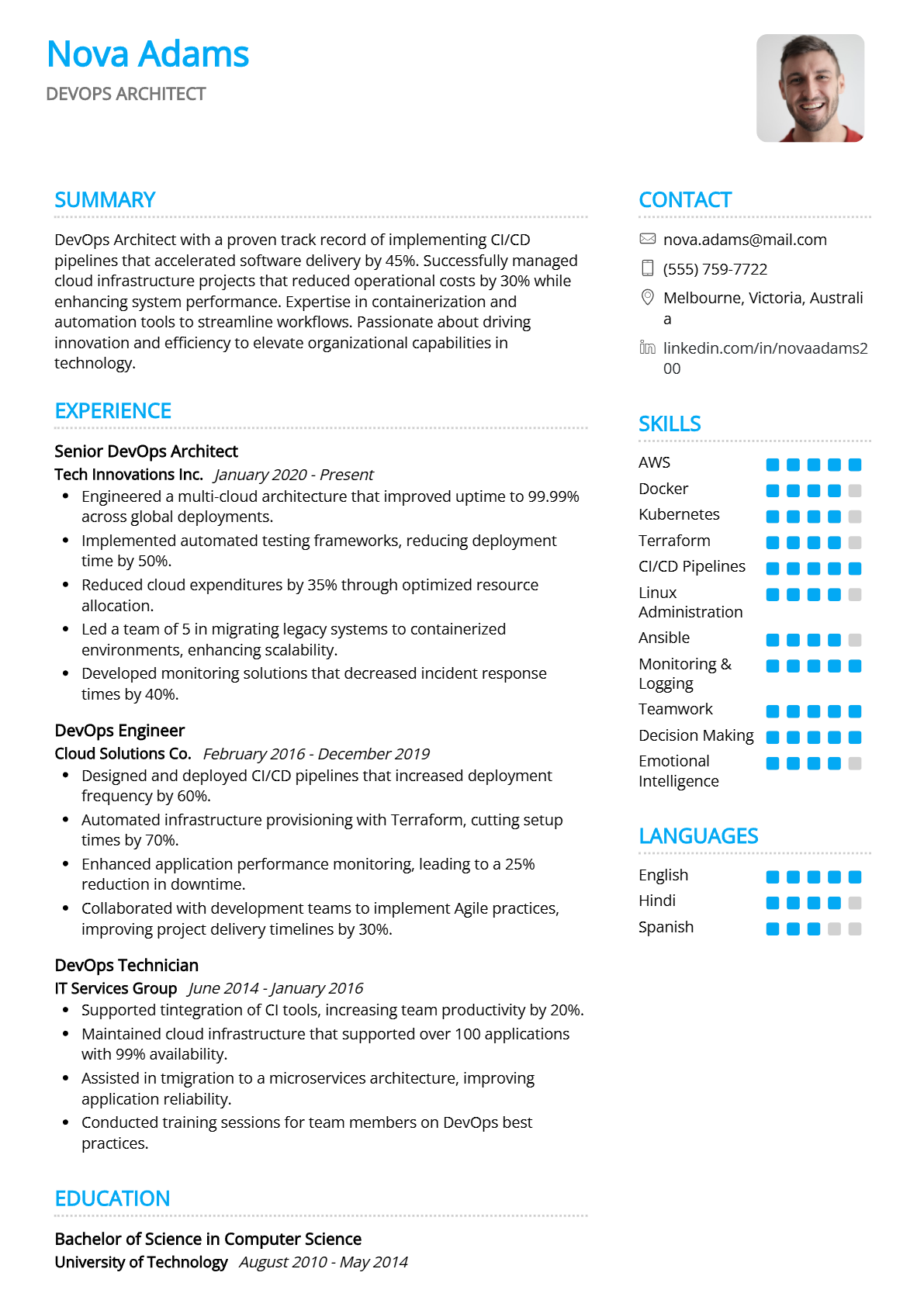
A DevOps Engineer plays a crucial role in bridging the gap between development and operations, ensuring seamless integration and delivery of software. This profession entails automating processes, monitoring system performance, and fostering collaboration among teams to enhance efficiency and reliability. In today’s fast-paced tech landscape, the demand for skilled DevOps Engineers is surging, as organizations seek to accelerate their development cycles and improve product quality. This article aims to provide valuable insights into crafting an effective resume tailored for aspiring DevOps Engineers, highlighting key skills and best practices to stand out in a competitive job market.
- DevOps Engineer resume examples
- How to format a DevOps Engineer resume
- How to write your DevOps Engineer resume experience
- How to list your hard skills and soft skills on your resume
- How to list your certifications and education on your resume
- How to write your DevOps Engineer resume summary or objective
- Additional sections for a DevOps Engineer resume
- Key takeaways for writing a professional DevOps Engineer resume
- Frequently Asked Questions
DevOps Engineer resume examples
DevOps Engineer resume examples serve as valuable tools for job seekers aiming to secure positions in this competitive field. By analyzing these examples, candidates can gain insights into the essential skills, experiences, and achievements that make an effective resume. This understanding helps them tailor their own resumes to highlight relevant competencies and stand out to potential employers.
DevOps Engineer Resume
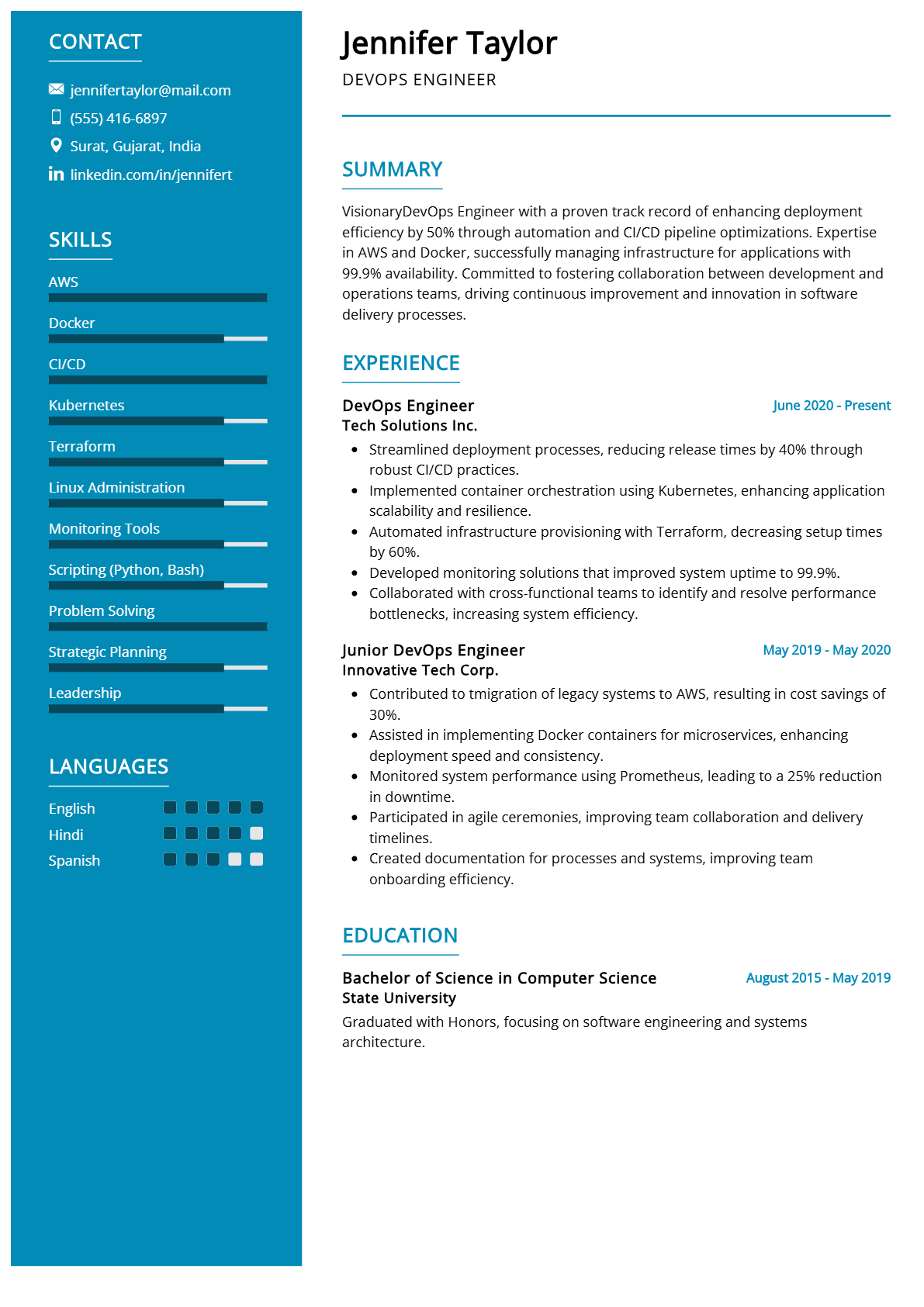
Why This Resume Works
This resume effectively showcases the candidate’s strong alignment with the DevOps Engineer position through a clear emphasis on key skills like AWS, Docker, CI/CD, Kubernetes, and Terraform. The structured format highlights approximately six years of relevant experience, making it easy for hiring managers to assess qualifications quickly. It is likely optimized for ATS compatibility by incorporating industry-specific keywords. Additionally, presenting measurable achievements in past roles underscores the candidate’s contributions to efficiency and automation, further appealing to prospective employers in this field.
Junior DevOps Engineer Resume
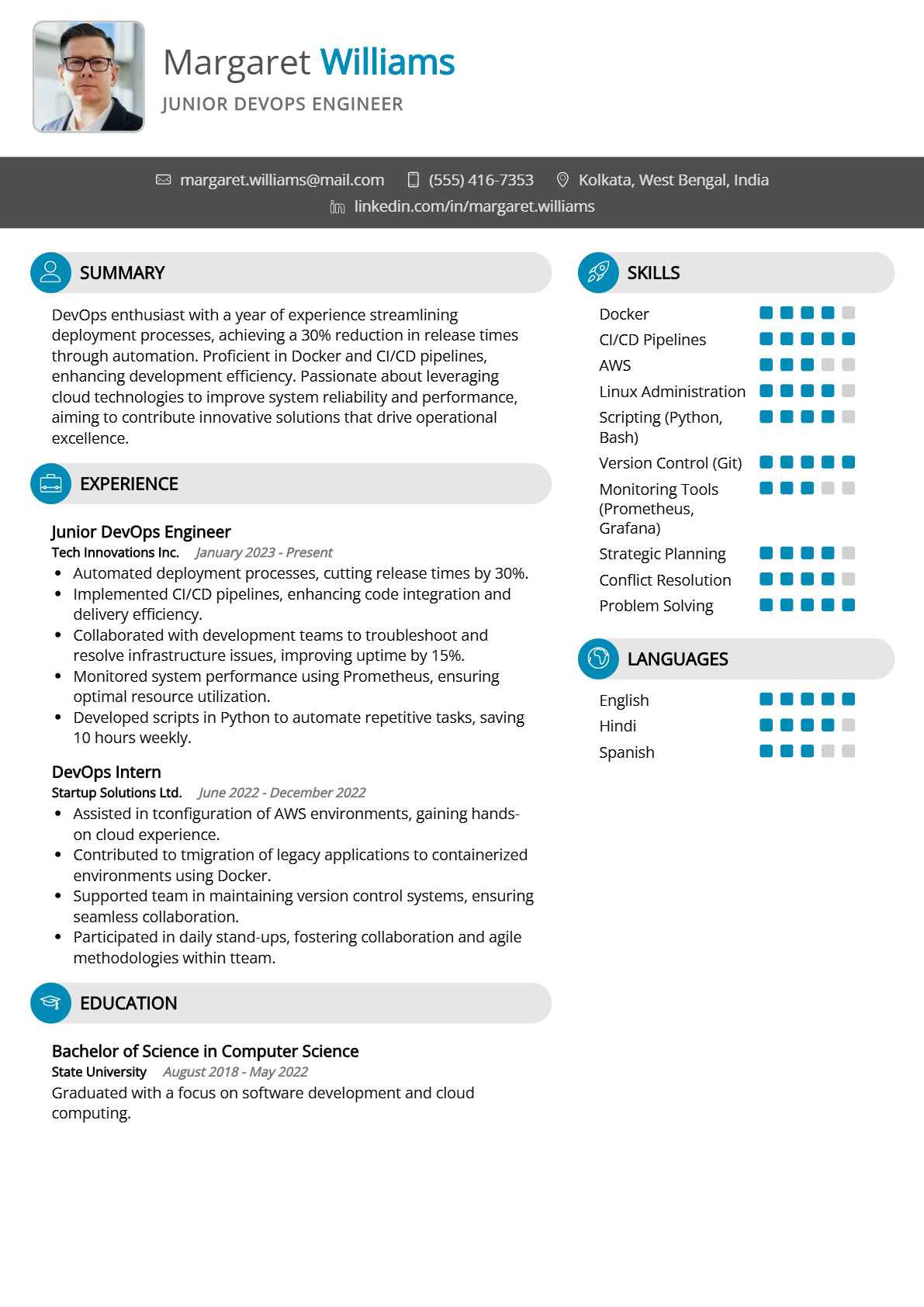
Why This Resume Works
This resume effectively highlights the candidate’s relevant skills, such as Docker and CI/CD pipelines, which are crucial for a Junior DevOps Engineer role. With approximately two years of experience in both a dedicated position and an internship, it demonstrates practical knowledge in AWS and Linux administration. The clear, structured format enhances readability and ensures ATS compatibility by incorporating industry-specific keywords. Additionally, the strategic presentation of achievements showcases the candidate’s ability to contribute to team efficiency, making them a strong fit for the position.
DevOps Engineer with Cloud Specialization Resume
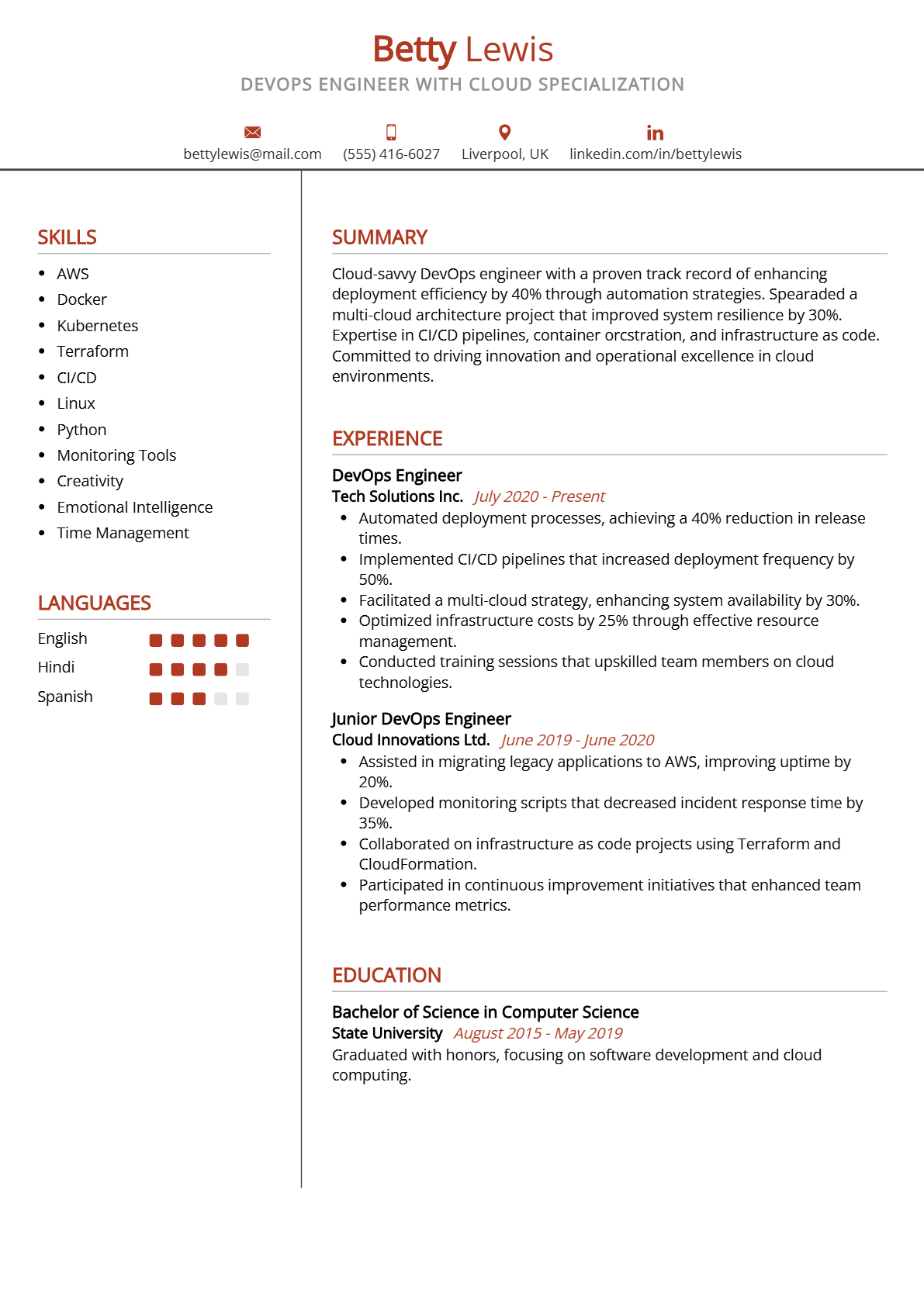
Why This Resume Works
This resume effectively showcases the candidate’s suitability for a DevOps Engineer with Cloud Specialization position by emphasizing key skills such as AWS, Docker, Kubernetes, and Terraform, which are essential in this role. With approximately six years of relevant experience, the structured format highlights achievements in CI/CD processes that resonate with industry demands. The resume is optimized for ATS compatibility, utilizing targeted keywords specific to the field. This strategic presentation underscores the candidate’s readiness to meet contemporary cloud challenges effectively.
Senior DevOps Engineer Resume
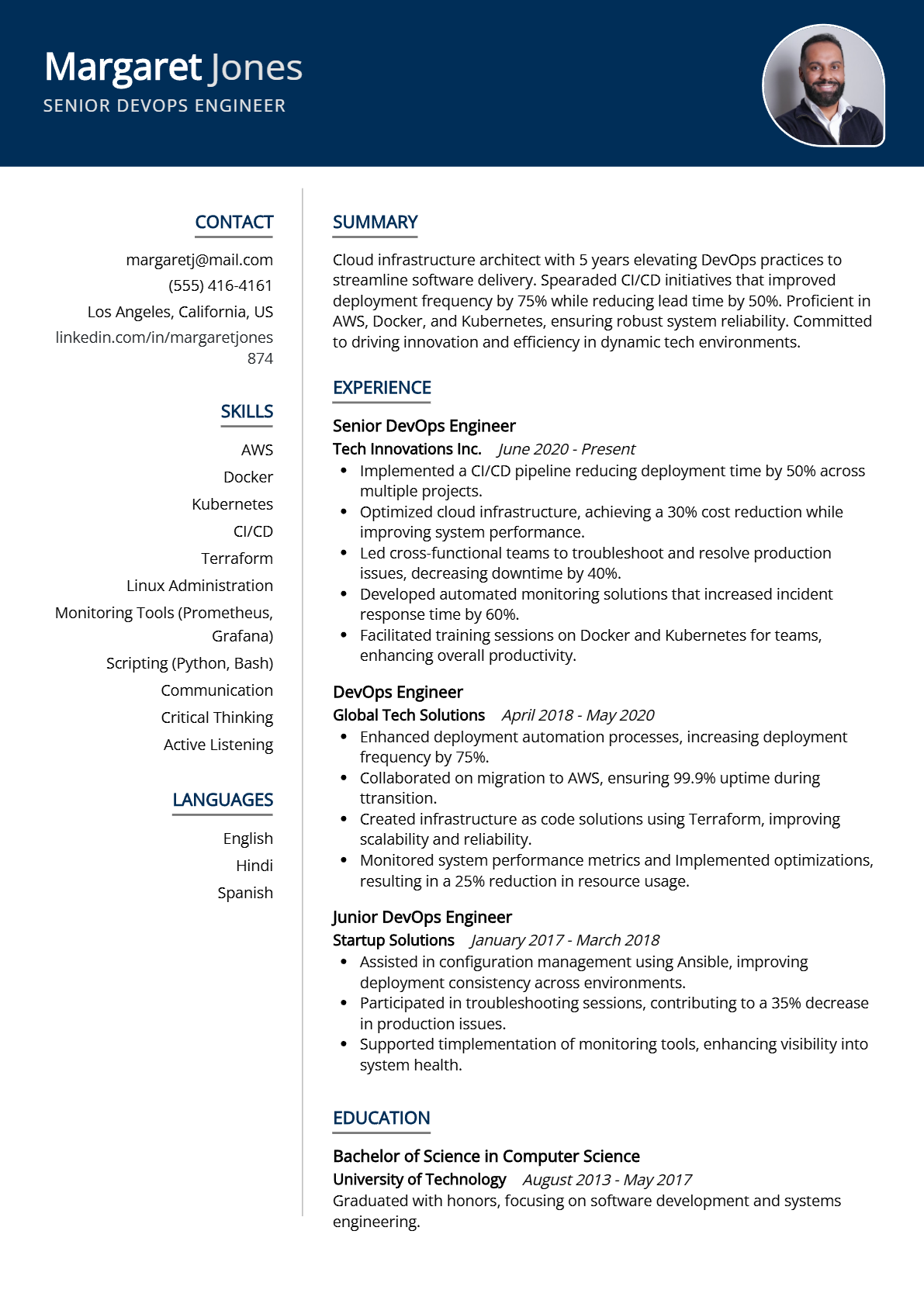
Why This Resume Works
This resume effectively positions the candidate for a Senior DevOps Engineer role by showcasing key skills like AWS, Docker, Kubernetes, CI/CD, and Terraform, which are critical for modern DevOps practices. With approximately eight years of relevant experience at various levels, it illustrates a clear career progression. The format is clean and structured, enhancing readability and ATS compatibility. Strategic presentation of achievements highlights quantifiable impacts in previous roles, aligning with industry demands for efficiency and innovation in deployment processes.
Aspiring DevOps Engineer Resume
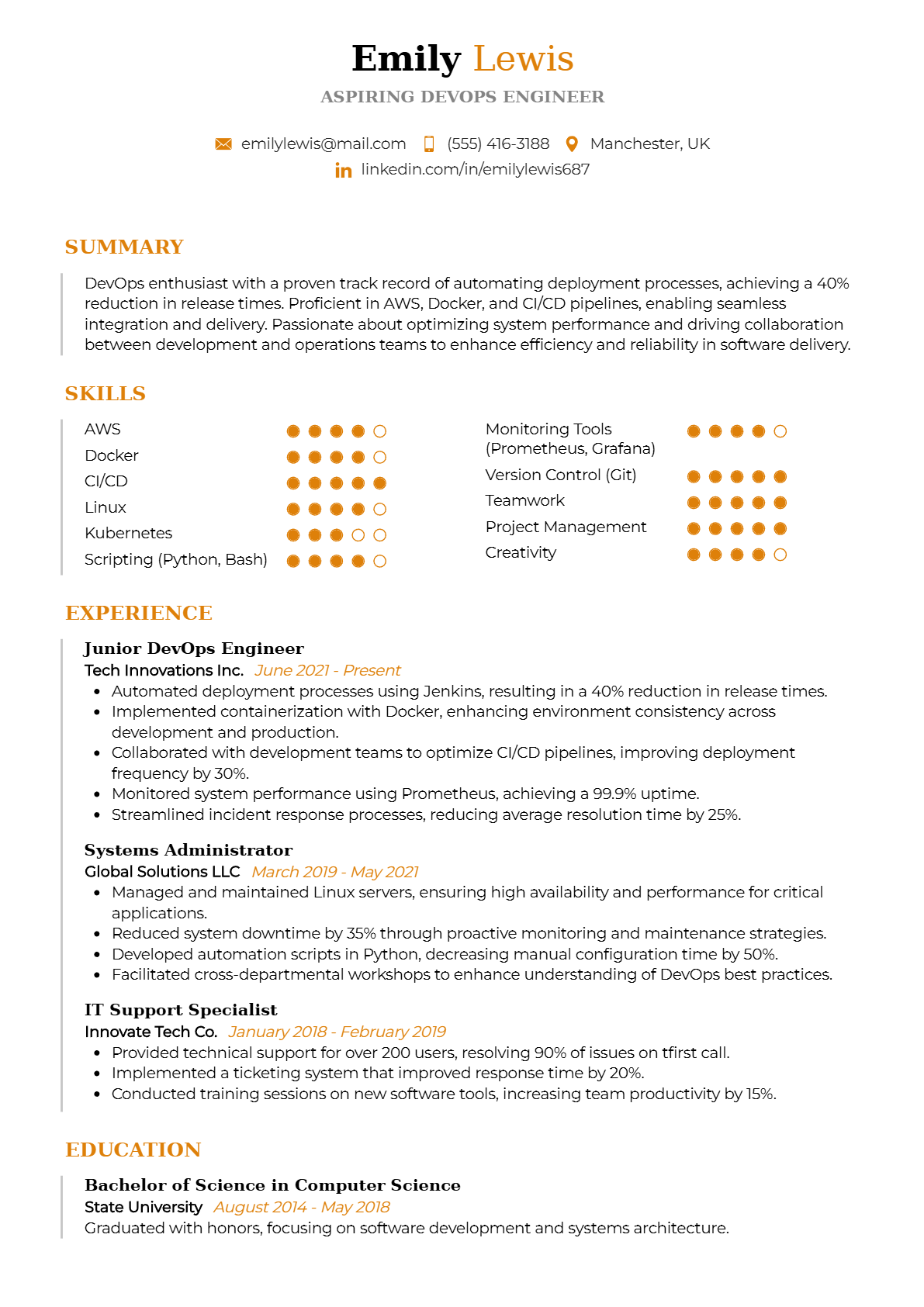
Why This Resume Works
This resume effectively positions the candidate as an aspiring DevOps Engineer by highlighting relevant skills such as AWS, Docker, CI/CD, Linux, and Kubernetes. Their combined seven years of experience in roles like Junior DevOps Engineer and Systems Administrator demonstrate a solid technical foundation. The clear format and structured layout enhance readability for hiring managers. Additionally, the inclusion of industry-specific keywords ensures ATS compatibility. Strategic presentation of achievements related to process improvements and automation further underscores their potential impact in a DevOps role.
DevOps Architect Resume

Why This Resume Works
This resume effectively highlights the candidate’s extensive experience as a Senior DevOps Architect, showcasing key skills in AWS, Docker, Kubernetes, Terraform, and CI/CD pipelines that are crucial for the role. Its clear format emphasizes relevant achievements, such as successful project implementations that improve efficiency and reduce costs. By incorporating industry-specific keywords, it ensures ATS compatibility, increasing visibility to hiring managers. Overall, this strategic presentation makes a compelling case for the candidate’s suitability for a DevOps Architect position.
DevOps Automation Specialist Resume
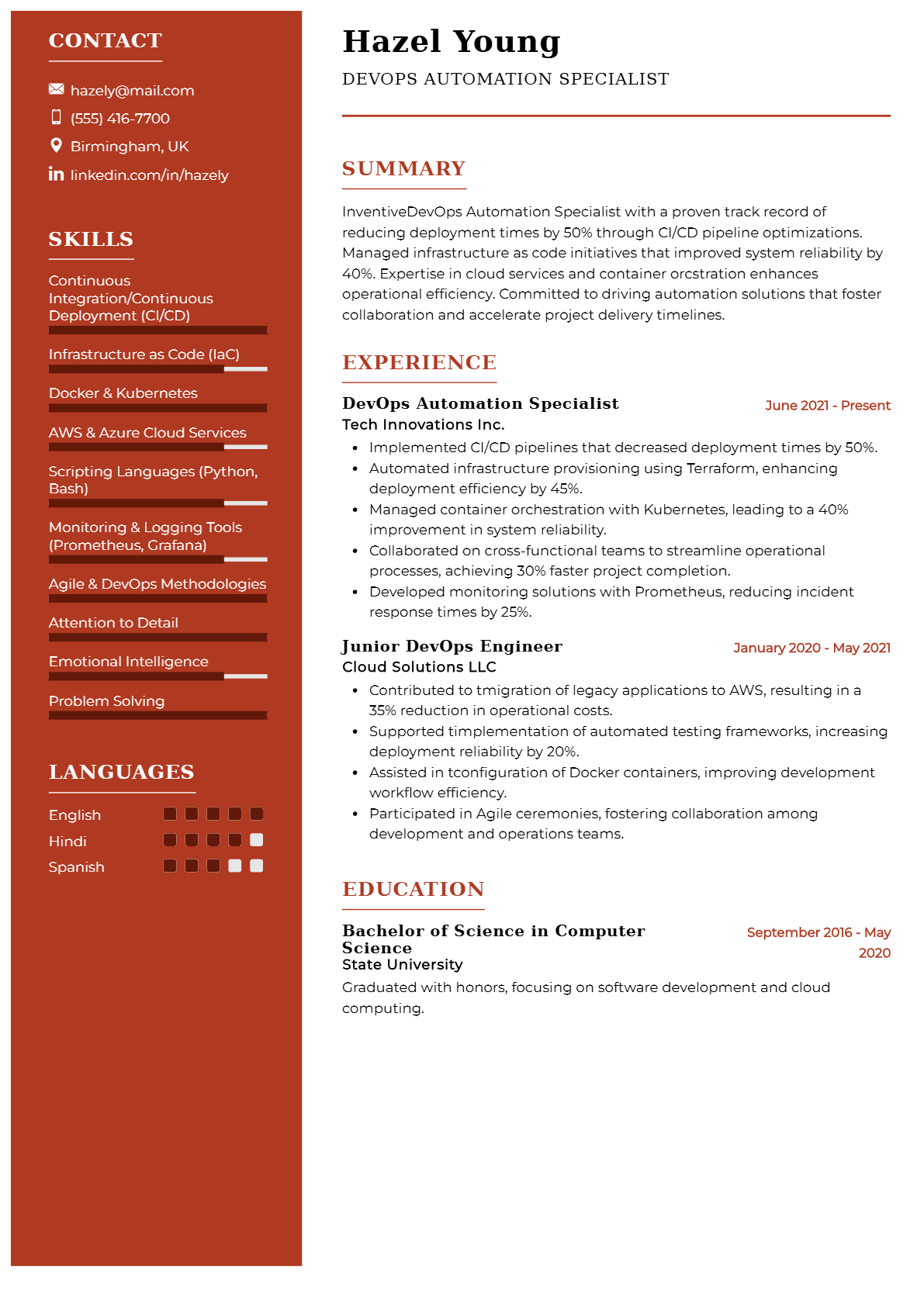
Why This Resume Works
This resume effectively targets the DevOps Automation Specialist position by highlighting essential skills such as CI/CD, Infrastructure as Code, and proficiency in Docker, Kubernetes, AWS, and Azure. With approximately five years of relevant experience in both roles, it demonstrates a solid career progression. The structured format enhances readability for hiring managers and ensures ATS compatibility through strategic keyword usage. Additionally, showcasing specific achievements related to automation and cloud services emphasizes the candidate’s impact in previous roles, making them a strong fit for the position.
Lead Site Reliability Engineer Resume
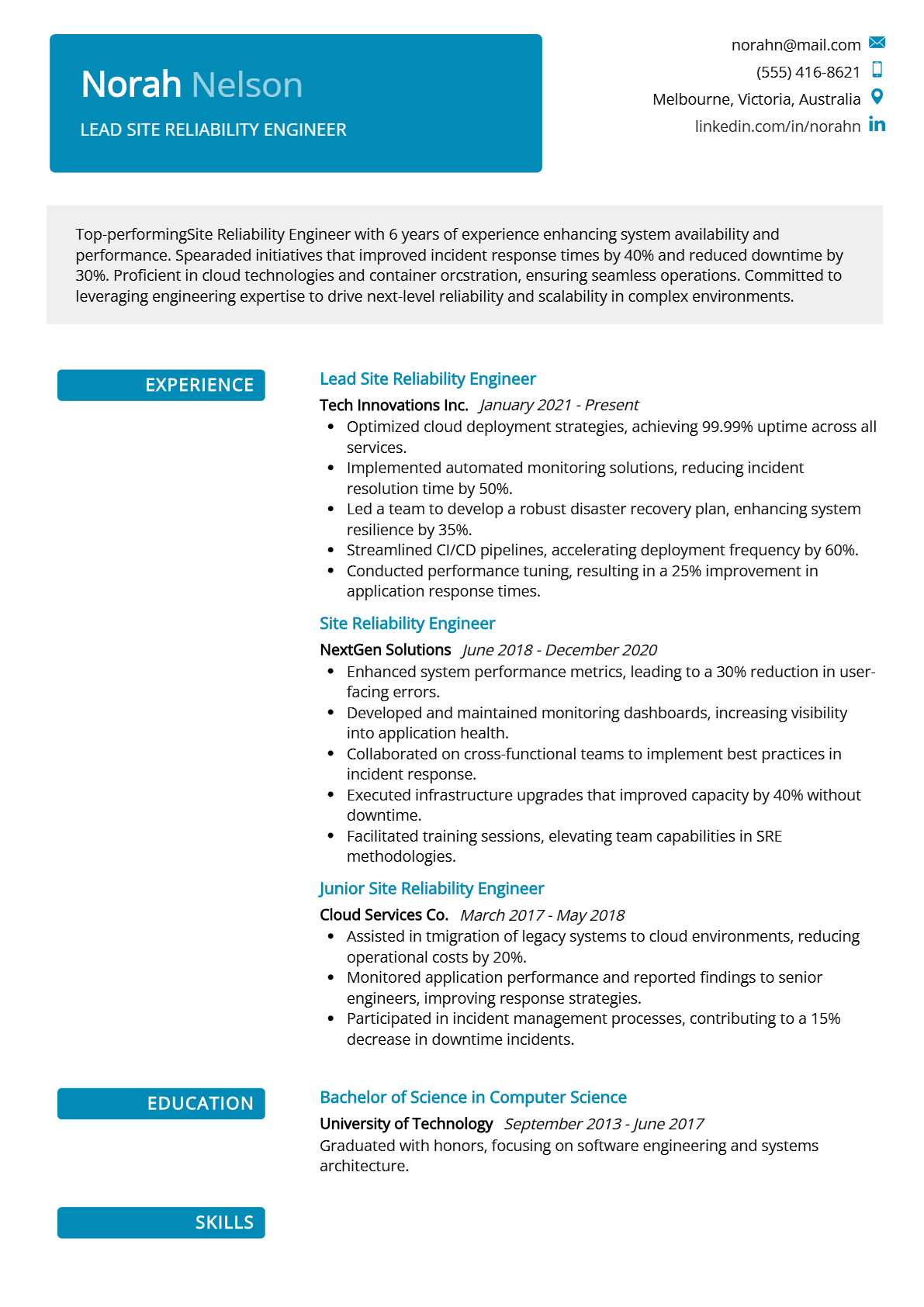
Why This Resume Works
This resume effectively showcases the candidate’s qualifications for a Lead Site Reliability Engineer position by highlighting essential skills like cloud infrastructure management and container orchestration with Kubernetes. With seven years of progressive experience, it demonstrates a clear career trajectory in site reliability engineering. The format is clean and structured, facilitating easy navigation for both hiring managers and ATS systems. Additionally, strategic presentation of achievements in incident management and performance monitoring emphasizes the candidate’s impact in previous roles, making them an appealing choice for this position.
Principal DevOps Consultant Resume
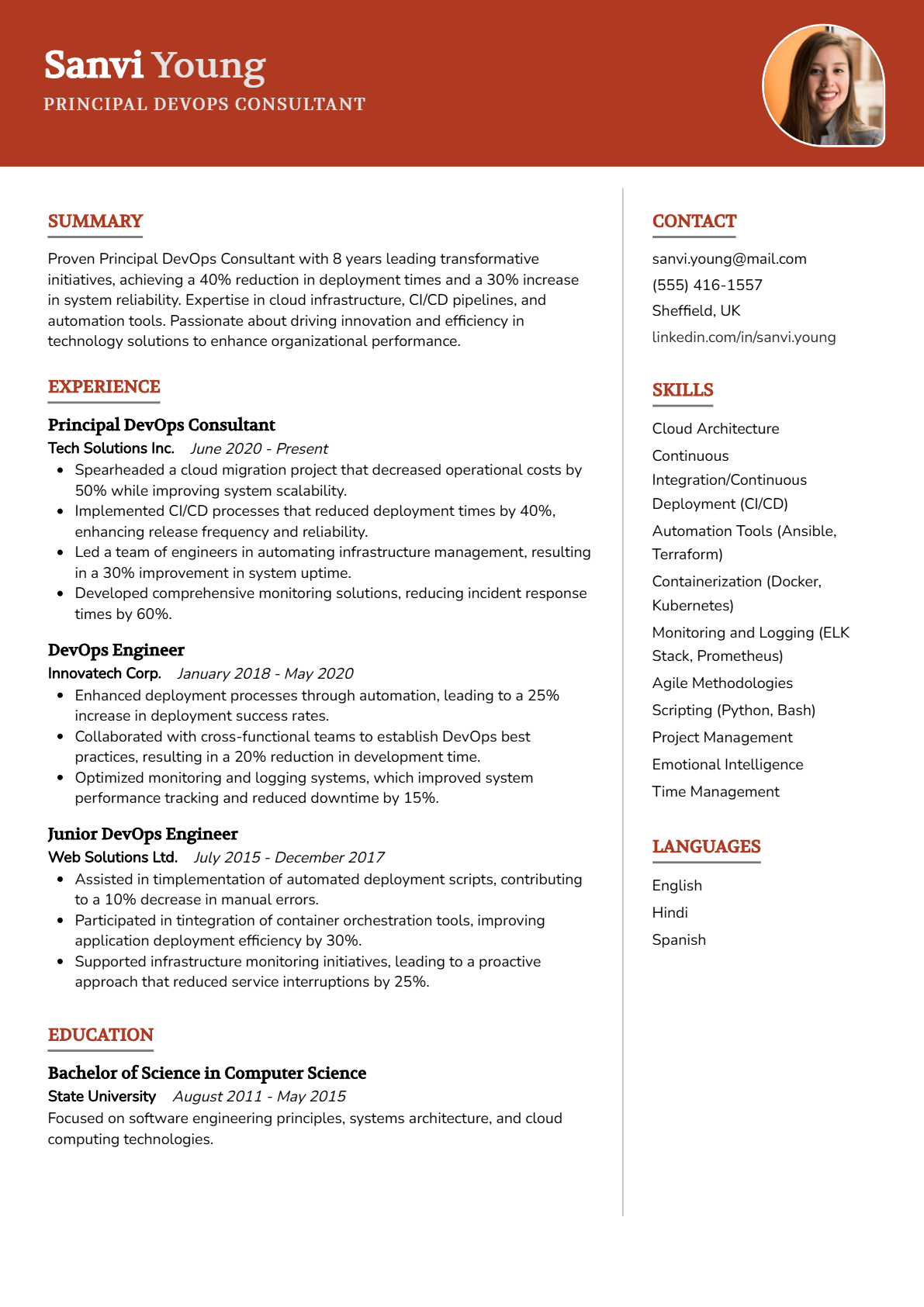
Why This Resume Works
This resume effectively showcases a strong alignment with the Principal DevOps Consultant role through its emphasis on key skills like Cloud Architecture, CI/CD, and automation tools. With nearly nine years of progressive experience, it highlights relevant roles that demonstrate expertise in deploying scalable solutions. The clear format enhances readability, making it easy for hiring managers to identify qualifications quickly. Additionally, the use of industry-specific keywords ensures ATS compatibility, while strategic presentation of achievements promises tangible value to potential employers in the DevOps landscape.
DevOps Transformation Manager Resume
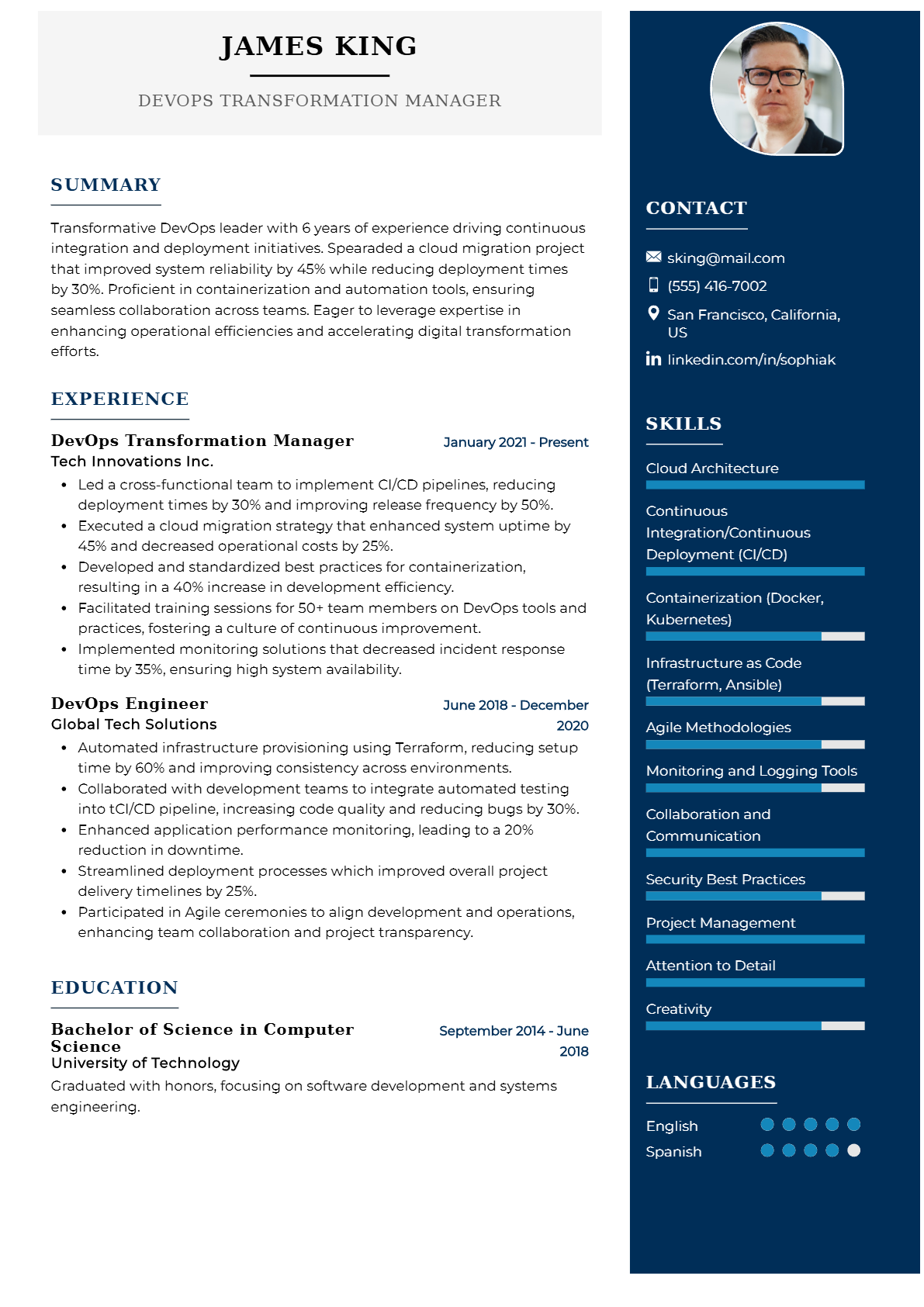
Why This Resume Works
This resume effectively positions the candidate for a DevOps Transformation Manager role by highlighting essential skills like Cloud Architecture, CI/CD, and Infrastructure as Code, directly aligning with industry demands. The structured format emphasizes relevant experience in both managerial and engineering roles, showcasing a comprehensive understanding of DevOps practices. It incorporates keywords for ATS compatibility, ensuring visibility during screening. Additionally, strategic presentation of achievements demonstrates the candidate’s impact on previous projects, making them a compelling choice for organizations seeking transformation leaders in DevOps.
Containerization and Orchestration Expert Resume
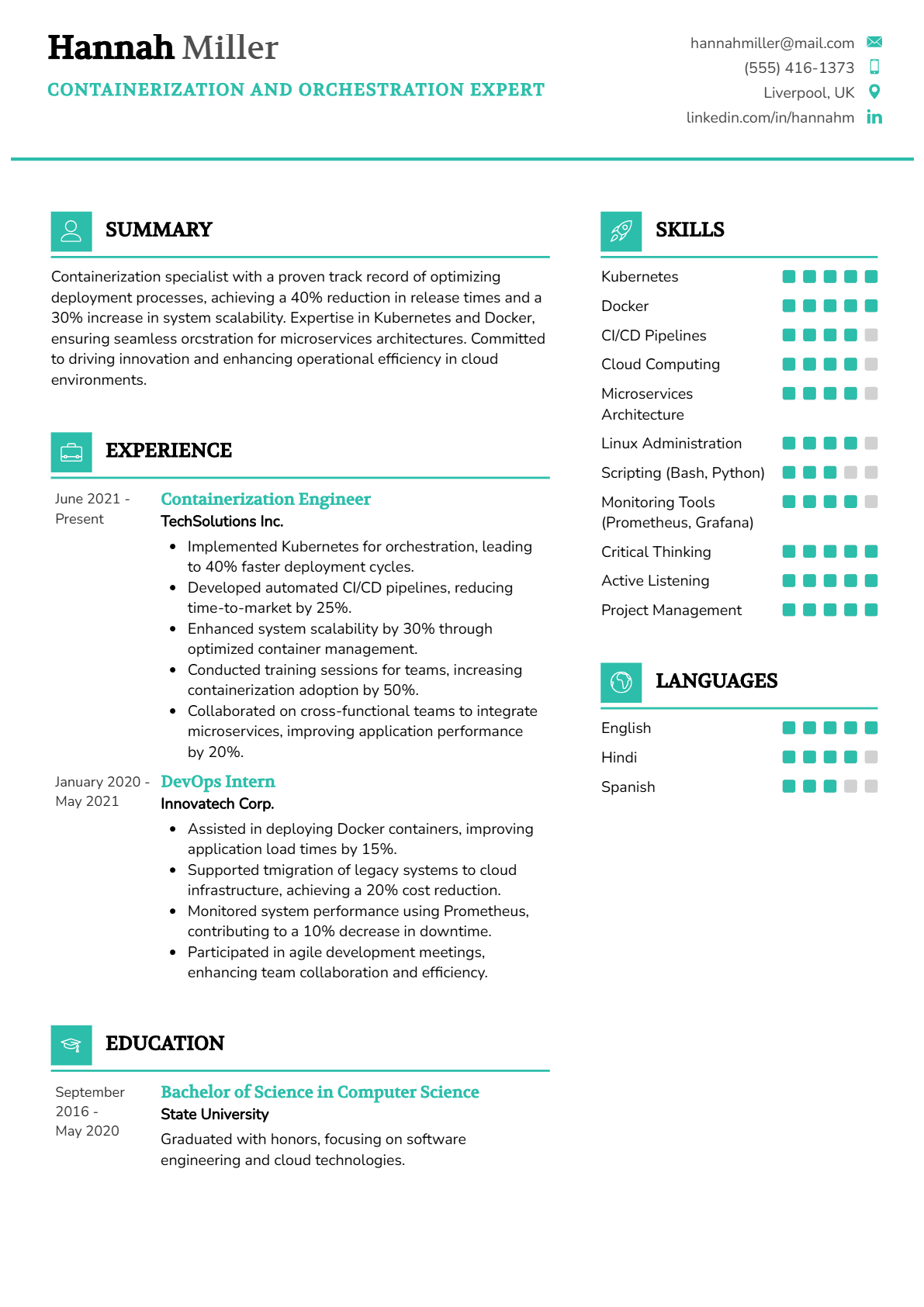
Why This Resume Works
This resume effectively showcases the candidate’s expertise in containerization and orchestration by highlighting key skills such as Kubernetes, Docker, and CI/CD pipelines. With approximately five years of relevant experience, including roles as a Containerization Engineer and DevOps Intern, it demonstrates a strong foundation in cloud computing and microservices architecture. The structured format enhances readability and allows for easy ATS compatibility, while strategically presented achievements emphasize impactful contributions in previous positions, making it an ideal fit for the Containerization and Orchestration Expert role.
DevSecOps Specialist Resume
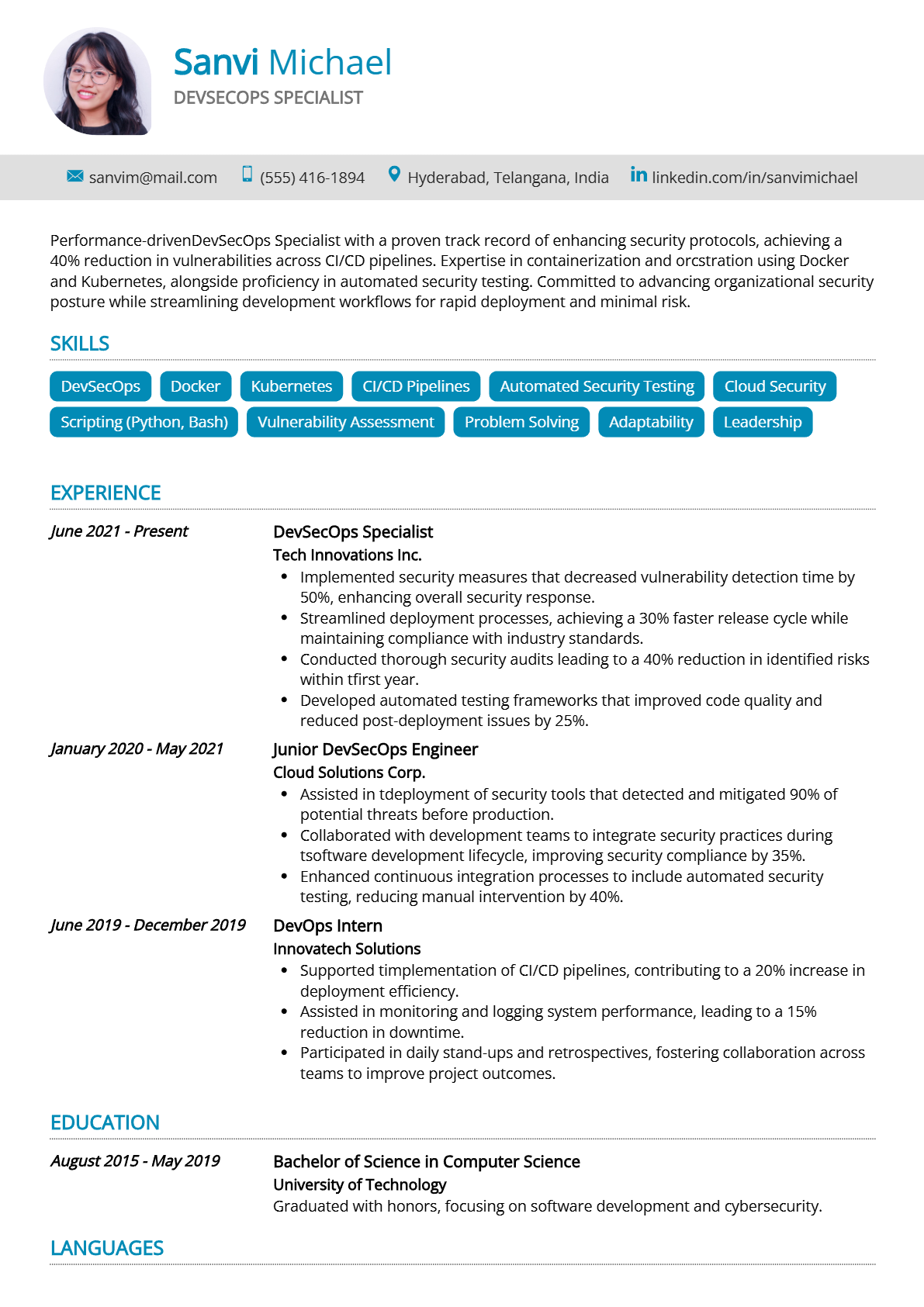
Why This Resume Works
This resume effectively highlights the candidate’s relevant skills and experience for a DevSecOps Specialist position, showcasing expertise in critical areas like Docker, Kubernetes, and CI/CD pipelines. The structured format emphasizes key competencies and achievements, making it easy to read for both hiring managers and Applicant Tracking Systems (ATS). By detailing approximately five years of progressive experience in DevSecOps roles, the resume strategically presents accomplishments that resonate within the industry, ensuring the candidate stands out as a qualified professional ready to enhance security in development operations.
Kubernetes Platform Engineer Resume
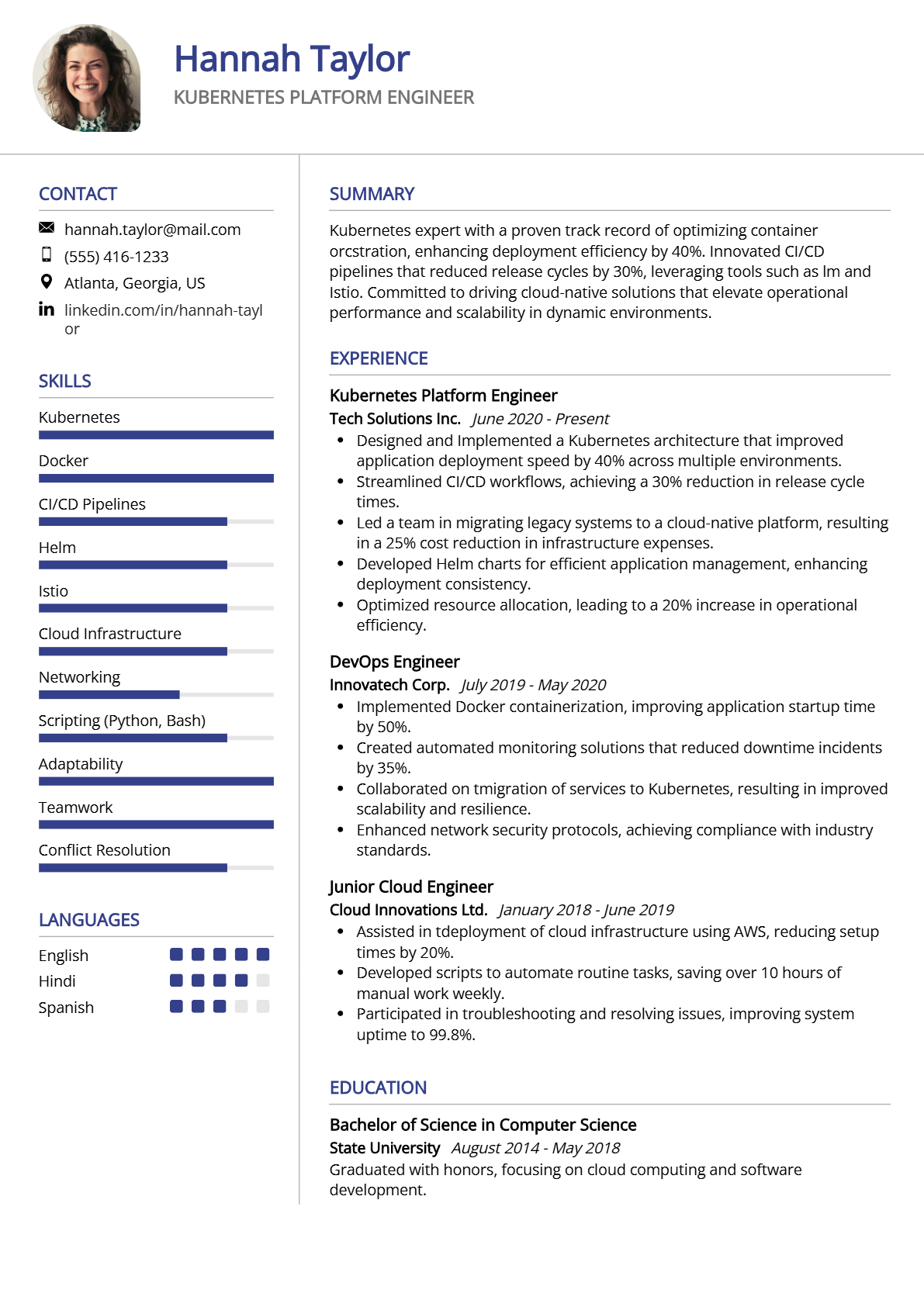
Why This Resume Works
This resume effectively highlights the candidate’s relevant skills, such as Kubernetes and CI/CD Pipelines, directly aligning with the requirements of a Kubernetes Platform Engineer. With approximately seven years of experience in progressively responsible roles, it demonstrates a solid career trajectory. The structured format allows for easy scanning by ATS, ensuring compatibility with industry standards. Additionally, strategic presentation of key achievements showcases the candidate’s impact in previous positions, making them a compelling choice for potential employers seeking expertise in cloud-native environments.
CI/CD Pipeline Developer Resume
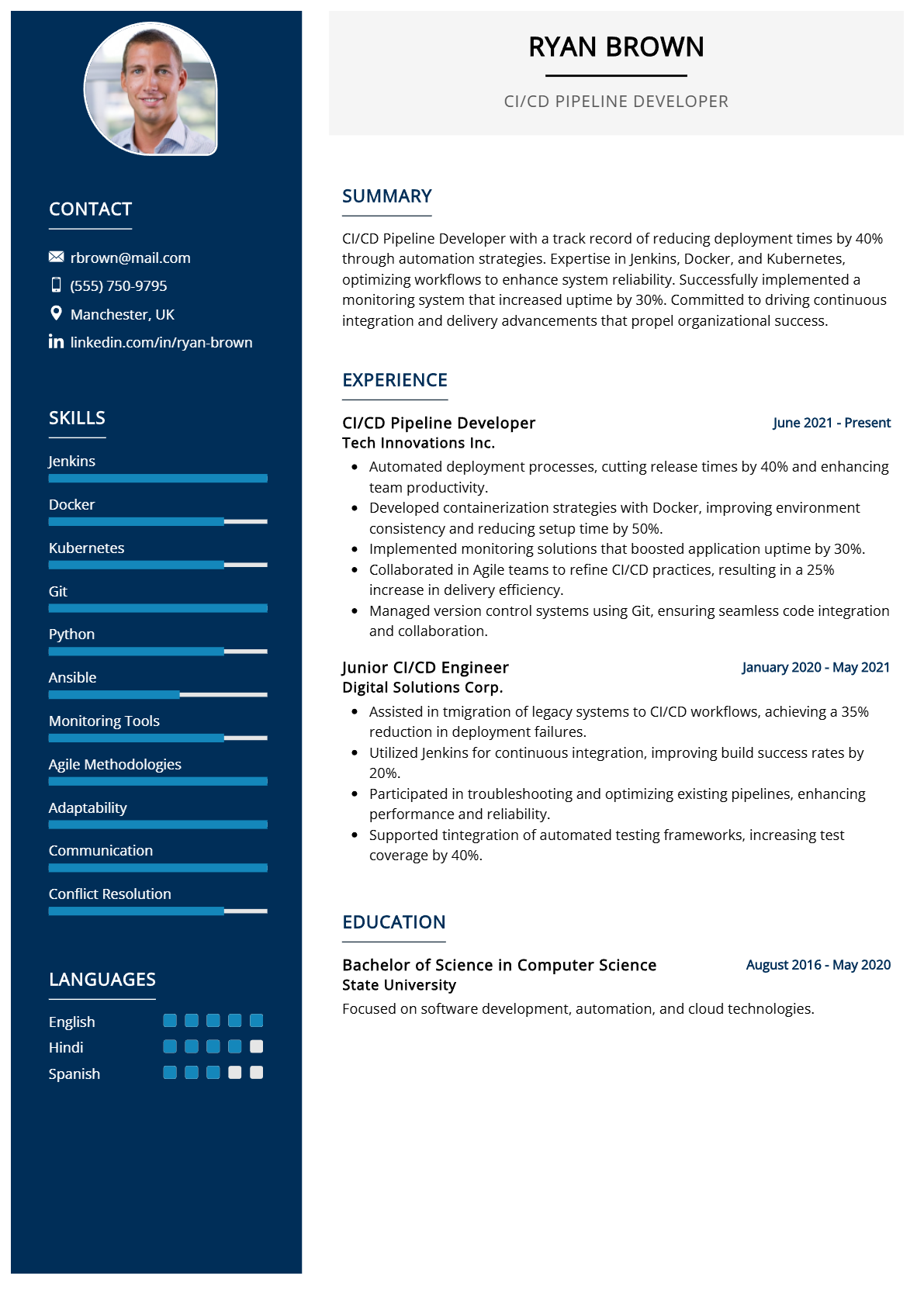
Why This Resume Works
This resume effectively highlights the candidate’s relevant skills, including Jenkins, Docker, and Kubernetes, which are crucial for a CI/CD Pipeline Developer role. With approximately five years of experience in similar positions, it showcases a solid career progression that aligns with industry expectations. The format is clear and structured, enhancing readability for hiring managers and ensuring ATS compatibility by incorporating relevant keywords. Additionally, strategic presentation of achievements emphasizes the candidate’s impact on pipeline efficiency and automation, making them an attractive choice for potential employers.
Cloud Infrastructure Engineer Resume
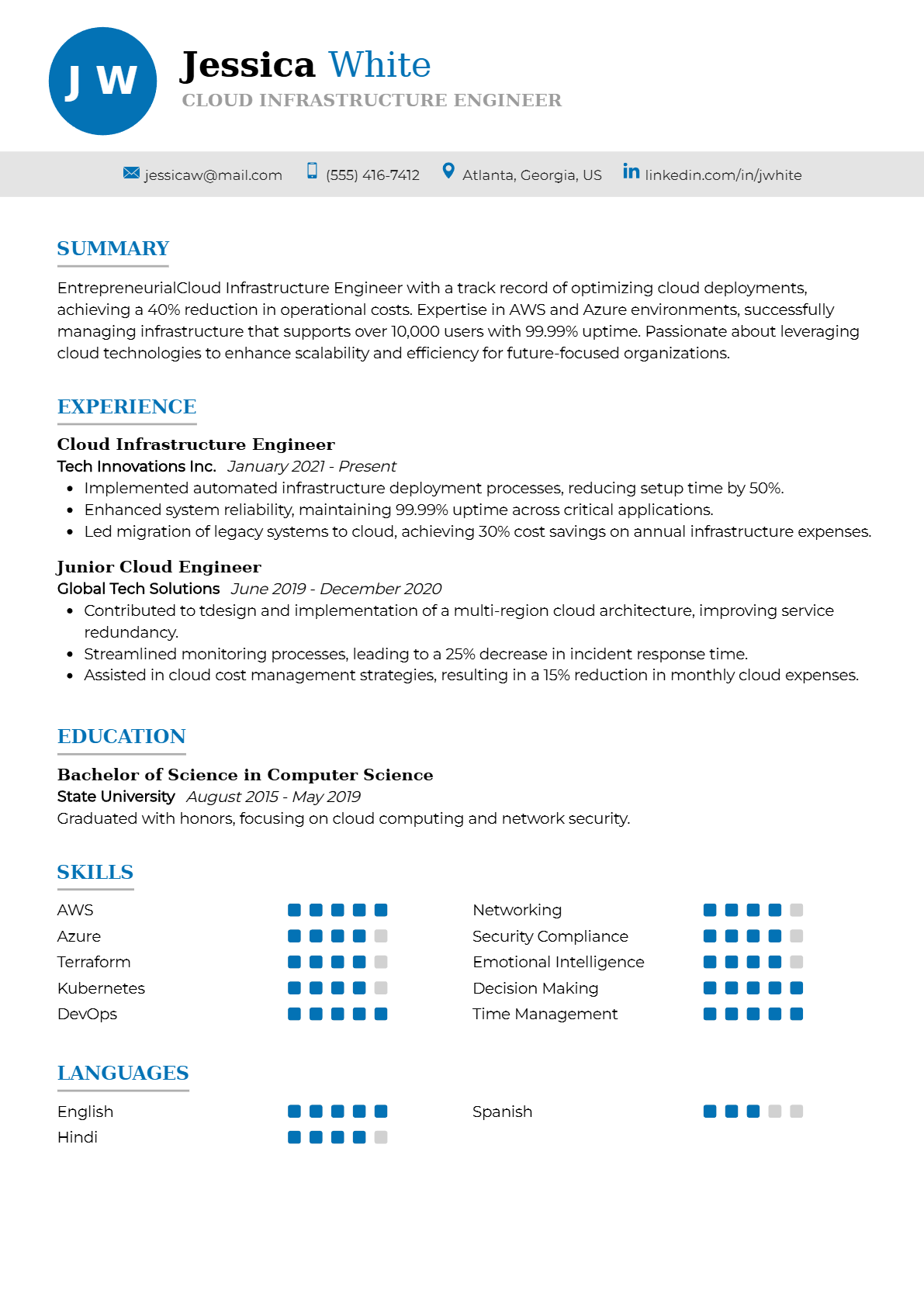
Why This Resume Works
This resume effectively highlights the candidate’s relevant skills, such as AWS and Azure expertise, paired with practical experience as a Cloud Infrastructure Engineer. The clear format emphasizes key competencies like Terraform and Kubernetes, making it easy for hiring managers to assess qualifications quickly. Its structured layout ensures ATS compatibility by incorporating industry-specific keywords. Additionally, the strategic presentation of achievements showcases measurable outcomes in cloud projects, aligning perfectly with the expectations for a Cloud Infrastructure Engineer role and enhancing the candidate’s appeal.
How to format a DevOps Engineer resume
Proper formatting is crucial for a DevOps Engineer resume as it enhances readability and highlights your technical skills effectively. A well-structured resume format allows hiring managers to quickly identify your qualifications and experience, increasing your chances of landing an interview.
- Use a clean, professional layout with clear headings to categorize sections like skills, experience, and education. This organization helps recruiters quickly navigate your resume.
- Prioritize relevant technical skills by placing them prominently at the top of your resume. Highlight skills such as CI/CD, cloud platforms, and containerization to grab attention immediately.
- Utilize bullet points for your work experience to present accomplishments succinctly. Each bullet should begin with a strong action verb and quantify results to showcase your impact.
- Include a summary statement that encapsulates your DevOps expertise and career goals. This section should be concise and tailored to the specific job you are applying for.
- Choose a legible font and maintain consistent formatting throughout, including font size and spacing. A well-formatted resume reflects attention to detail, which is crucial in the DevOps field.
How to write your DevOps Engineer resume experience
Effectively presenting work experience on a DevOps Engineer resume is crucial, as it showcases your technical expertise and practical application of DevOps principles. Employers seek candidates who can demonstrate their ability to streamline operations, improve system reliability, and enhance deployment processes through their past roles. A well-crafted experience section highlights specific achievements and the technologies used, providing context for your contributions.
How to list your hard skills and soft skills on your resume
In the competitive field of DevOps engineering, showcasing both hard and soft skills on your resume is crucial for standing out to potential employers. Hard skills demonstrate your technical expertise and proficiency in tools and technologies essential for the role, while soft skills highlight your ability to collaborate effectively, communicate clearly, and adapt to changing environments. A balanced combination of these skills reflects your capability to not only execute tasks but also work seamlessly within diverse teams to drive project success.
Hard Skills:
- Continuous Integration/Continuous Deployment (CI/CD): Proficiency in automating code deployment and testing processes.
- Containerization: Experience with Docker and Kubernetes for managing application containers.
- Cloud Services: Knowledge of AWS, Azure, or Google Cloud platforms for scalable infrastructure.
- Infrastructure as Code (IaC): Familiarity with tools like Terraform or Ansible for managing infrastructure through code.
- Version Control Systems: Expertise in Git for tracking changes in code repositories.
- Scripting Languages: Proficient in Python, Bash, or Ruby for automation tasks.
- Monitoring and Logging: Experience with tools like Prometheus and ELK Stack for system performance monitoring.
- Networking: Understanding of network protocols and configurations necessary for cloud environments.
- Database Management: Knowledge of SQL and NoSQL databases for data storage and retrieval.
- Agile Methodologies: Familiar with Agile practices and tools for managing project workflows.
- Configuration Management: Understanding of tools like Puppet or Chef for system configuration automation.
- Security Best Practices: Knowledge of security protocols to ensure application and infrastructure security.
- Load Balancing: Experience with distributing network traffic to optimize resource use.
- Performance Tuning: Skills in optimizing application performance and resource usage.
- Backup and Recovery: Familiarity with strategies for data backup and disaster recovery.
Soft Skills:
- Problem Solving: Ability to analyze issues and develop effective solutions quickly.
- Collaboration: Strong team player who works well with cross-functional teams.
- Communication: Excellent verbal and written skills to convey technical information effectively.
- Adaptability: Ability to adjust to new tools and processes in a fast-paced environment.
- Time Management: Skill in prioritizing tasks and managing time efficiently.
- Critical Thinking: Capacity to evaluate situations and make informed decisions.
- Attention to Detail: Keen eye for details to ensure quality in code and processes.
- Leadership: Ability to guide teams and projects toward successful outcomes.
- Conflict Resolution: Skill in addressing and resolving disagreements constructively.
- Creativity: Innovative thinking to improve processes and solve complex challenges.
- Empathy: Understanding team members’ perspectives and fostering a supportive work environment.
- Proactiveness: Taking initiative to identify and address potential issues before they arise.
- Mentorship: Willingness to guide and support junior team members.
- Open-Mindedness: Receptiveness to new ideas and feedback from others.
- Customer Focus: Understanding and prioritizing the needs of stakeholders and clients.
- Resilience: Ability to remain calm and effective under pressure.
How to list your certifications and education on your resume
To effectively present certifications and education on a DevOps Engineer resume, prioritize relevant qualifications that demonstrate your expertise in both development and operations. Highlight certifications such as AWS Certified DevOps Engineer, Certified Kubernetes Administrator, or Docker Certified Associate, as they validate your proficiency in essential tools and technologies used in DevOps practices. Ensure your educational background includes degrees in Computer Science, Information Technology, or related fields, emphasizing coursework or projects that align with DevOps methodologies.
How to write your DevOps Engineer resume summary or objective
A strong resume summary or objective is crucial for a DevOps Engineer position as it provides a brief yet impactful overview of your skills, experiences, and career goals. A well-crafted summary highlights your technical proficiencies and accomplishments, while an objective statement conveys your aspirations and how you can contribute to the organization. Use a summary when you have relevant experience to showcase, and choose an objective if you are entering the field or changing roles.
Additional sections for a DevOps Engineer resume
Including additional sections in a DevOps Engineer resume can significantly enhance its impact by showcasing relevant skills, certifications, projects, and contributions to team success. These sections provide a more comprehensive view of your qualifications and fit for the role.
- Certifications: Including industry-recognized certifications like AWS Certified DevOps Engineer or Docker Certified Associate demonstrates your commitment to professional development and validates your expertise in critical tools and methodologies.
- Projects: Highlighting specific DevOps projects you’ve worked on can illustrate your hands-on experience. Detailing your role, technologies used, and outcomes provides concrete evidence of your capabilities and achievements.
- Technical Skills: A dedicated section for technical skills allows you to list essential tools and technologies such as Kubernetes, Jenkins, or Terraform, ensuring that hiring managers quickly see your qualifications.
- Contributions to Open Source: Showcasing contributions to open-source projects can demonstrate your passion for DevOps, community involvement, and ability to collaborate with others, making you stand out as a proactive candidate.
- Professional Affiliations: Listing memberships in professional organizations like the DevOps Institute or local tech meetups reflects your engagement with the industry and commitment to staying updated on trends, which can impress potential employers.
Key takeaways for writing a professional DevOps Engineer resume
- Highlight your experience with CI/CD pipelines and automation tools, showcasing how you improved deployment efficiency and reduced time-to-market for software products.
- Use clear metrics to demonstrate your impact, such as percentage improvements in system uptime or reductions in deployment times to create a compelling narrative.
- Tailor your resume to specific job descriptions, focusing on relevant skills and technologies that align with the position requirements to stand out in the applicant pool.
- Consider using resume templates that emphasize technical skills and project achievements, making it easier to format your information attractively and effectively.
- Leverage an ai resume builder to streamline the writing process, ensuring that your resume is polished and tailored to the latest industry standards.
Frequently Asked Questions
How long should my DevOps Engineer resume be?
Your resume should ideally be one page, especially if you have less than 10 years of experience. This length allows you to present a concise overview of your skills, accomplishments, and relevant experience without overwhelming the reader. However, if you have extensive experience or numerous projects, you may extend it to two pages, ensuring that every detail adds value to your candidacy and aligns with the requirements of the role you are applying for.
What is the best format for a DevOps Engineer resume?
The best format for a DevOps Engineer resume is a reverse chronological format. This structure allows you to highlight your most recent experience first, showcasing your current skills and relevant technologies. Use clear headings and bullet points for readability, and include sections for your technical skills, professional experience, education, and certifications. Additionally, consider using a clean, modern design that emphasizes your technical expertise and aligns with industry standards.
What should I highlight on my DevOps Engineer resume to stand out?
To stand out, highlight your technical skills in key areas such as cloud platforms (AWS, Azure, GCP), CI/CD tools (Jenkins, GitLab), and infrastructure as code (Terraform, Ansible). Showcase your experience with automation, containerization (Docker, Kubernetes), and monitoring tools. Additionally, emphasize successful projects, particularly those demonstrating collaboration with development and operations teams, as well as any process improvements that led to increased efficiency or reduced downtime.
What are some ways to quantify my experience on my DevOps Engineer resume?
To quantify your experience, include specific metrics that reflect your impact. For example, mention the number of deployments you managed per week, the reduction in deployment times, or the percentage of downtime decreased after implementing automation. You could also highlight cost savings achieved through process improvements or efficiencies gained by adopting new tools. These quantifiable achievements provide concrete evidence of your contributions and make your resume more compelling to potential employers.

